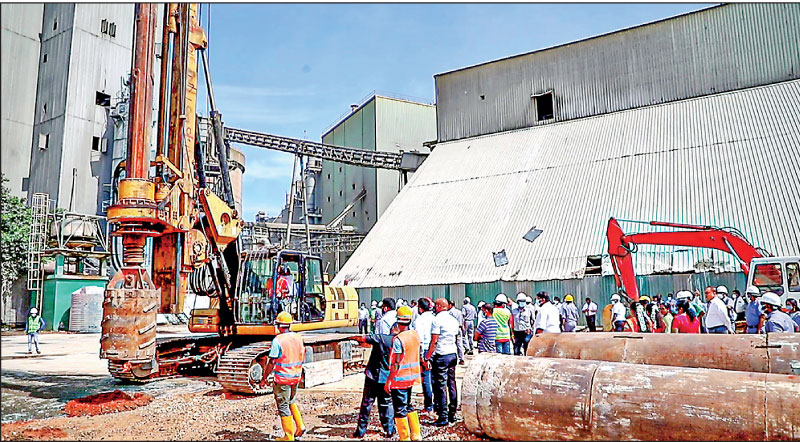Thursday Feb 19, 2026
Thursday Feb 19, 2026
Thursday, 10 February 2022 01:02 - - {{hitsCtrl.values.hits}}

Tokyo Cement Group’s factory expansion project in Trincomalee will add another 1 million tons to its production capacity
Tokyo Cement Group (Tokyo Cement) yesterday announced improved results for the third quarter of FY22 with key initiatives underway to ramp up supply amidst industry and macro challenges.
In the 3Q the Group saw turnover up 20% year-on-year to Rs. 13.7 billion but sales volumes reduced by 3% due to supply chain shortfalls. The Group pre-tax profit grew by 38% to Rs. 1.98 billion whilst after tax profit amounted to Rs. 1.65 billion, up by 27% from the 3Q of the previous year.
For the nine months of FY22, revenue grew by 19% to Rs. 36.3 billion but pre-tax profit was down by 43% to Rs. 2.5 billion and after tax lower by 49% to Rs. 2 billion.
Tokyo Cement said increase in cost of production due to higher freight and raw material costs and currency depreciation, led cement manufacturers to revise the retail price of a 50kg bag of cement to Rs. 1,275 with effect from 7 November.
“This 16% increment of price in a period of 3 years (against the MRP of Rs. 1,095 in 2019) is the lowest price increase across any building material, despite significant cost increases during the same period,” Tokyo Cement said. Further freight and raw material cost hikes increased the price of a 50kg bag of cement to the current retail price of Rs. 1,375 as of 1 January.
Commenting on the operating environment Tokyo Cement said unlike the preceding quarter this quarter did not see any lockdowns or strictly enforced travel restrictions, allowing for businesses to operate relatively uninhibited. However, the country experienced unusually heavy and persistent wet weather conditions throughout October and November which slowed down construction related activities.
During this quarter, we saw a scarcity of many construction essentials from cement to steel to tiles to all types of building materials and household accessories, due to the delays in opening LCs because of forex illiquidity. This shortage of construction materials in turn led to project delays and idle labour and therefore additional project expenditure.
This situation was compounded by finished cement importers drastically cutting down importation due to heightened fiscal barriers, thus resulting in a severe market shortage. While Tokyo Cement enforces the MRP with its retailers, the scarcity of cement has allowed for a secondary market to emerge in which cement is sold beyond the labelled prices.
Tokyo said the 3% drop in sales compared to the 3QFY21 was as a result of multiple restrictions on the company’s output. Delays in opening LCs in a timely manner inhibited the continuous supply of both raw material for production, as well as the importation of cement as a finished good. On the other hand, Tokyo Cement’s local production process had a minor setback due to a breakdown of a cement grinding mill for a period of more than two weeks towards the end of Q3.
However, to ensure an uninterrupted supply to the market and compensate for reduced local manufacturing output, the company increased cement importation by 20% during the 3rd quarter compared to the same quarter last year, importing not only bulk cement but also bagged cement to satiate market demand.
Despite a very challenging market environment, Tokyo Cement was able to maintain its market share of 35% during the third quarter of this year, similar to what was held the previous year.
In terms of outlook, the company said continuous increases in global coal and oil prices, in addition to freight costs are expected to escalate the cost of raw materials further. Global losses in production efficiencies due to the spread of the Omicron variant will continue to impact raw material prices and create further supply chain shortfall. Increasing case numbers across the country could lead to reduced economic activity and productivity reductions in construction sites.
“The company is confident of maintaining local production levels at the highest possible capacity utilisation to ensure an uninterrupted supply,” the statement said. In keeping with this assurance, Tokyo Cement kicked off two strategic business expansion projects during 3Q. First was the laying of foundation for a factory expansion project, to increase the manufacturing capacity of Tokyo Cement by another 1 million Metric Tons by early 2023. The project will increase Tokyo Cement Group’s total cement grinding capacity to 4 million MT. Next, the Company started trial runs of the Tokyo Cement Colombo Terminal expansion which should come online in Q4. This terminal expansion will ramp up the Company’s total bulk cement importation, packaging and distribution capacity from 600,000 MT p.a. to over 1,000,000 MT p.a.
In terms of the national economy, Tokyo Cement said immediate measures must be implemented to attract dollar remittances and investments in the short term to increase the country’s foreign reserves, coupled with more focused approaches to reinstate investor confidence. Further depreciation of the currency would have a profitability impact on the recorded period as imported materials are exposed to credit of over 180 days.
“More holistic and long-term policy frameworks must be implemented to encourage local manufacturers to maximise existing installed production capacity. The implementation of such policy must be part of a wide-ranging national framework to reduce the dependency on imports and contribute significantly to reduce unnecessary outflow of foreign exchange,” Tokyo Cement added.